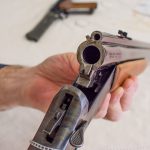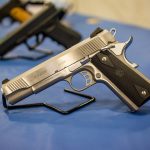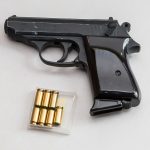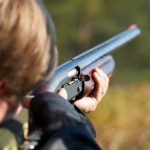Can I Appeal the Refusal or Revocation of a Firearms Licence?

If you are refused a firearms licence, or your existing firearms licence has been revoked, you will receive a written notice from police advising you of this.
If you are unsatisfied with the decision, you have 28 days from the time you receive the notice to request an internal review by the Commissioner of Police.
Information on how to go about an internal review will be contained on your notification.
What if the internal review is unsuccessful?
If the internal review is unfavourable, you have 28 days from when you receive the outcome to lodge an Application for Administrative Review with the NSW Civil and Administrative Tribunal (NCAT).
Mandatory versus discretionary refusal
Before you lodge your NCAT application, it is important that you carefully read both the original notice from police and the reasons for the outcome of the internal review.
If the refusal or revocation was a “mandatory refusal”, the NCAT will have no power to overturn it.
Grounds for mandatory refusal are listed =in section 11(5) of the Firearms Act 1996 this is known, and include:
- where you have been convicted of offences or other circumstances that are comprehensively listed in section 5 of the Firearms Regulation 2017 (NSW);
- where you are subject to an interim, provisional or final apprehended violence order;
- where you are subject to a firearms prohibition order; and
- where you are subject to being a registerable person under the Child Protection (Offenders Registration) Act 2000 (NSW).
Relevant offences and order will apply even if they occurred in another state or territory, or even overseas.
Your notice of decision will advise you of your review rights.
Powers of the NCAT
The power of the NCAT to review a refusal or revocation is contained in section 75(1) the Firearms Act 1996 (NSW) (the Act) and covers the decisions for:
(a) the refusal of or failure by the Commissioner to issue a licence or permit (other than a permit in respect of a prohibited firearm) to the person,
(b) a condition imposed by the Commissioner on a licence or permit issued to the person,
(c) the revocation of a licence or permit issued to the person (other than a revocation on the basis that the holder of the licence or permit is subject to a firearms prohibition order or an apprehended violence order),
(d) the refusal of or failure by the Commissioner to register a firearm,
(e) the cancellation of the registration of a firearm by the Commissioner,
(f) a firearms prohibition order made against the person, or
(g) a decision made under the regulations concerning the person that belongs to a class of decisions prescribed by the regulations for the purposes of this paragraph.
How can I apply?
Once you are ready to proceed to apply to the NCAT, you will need to:
- Download the application form from their website.
- Complete the Application – you will need 3 copies of this.
- Attach a copy of the letters from the Police regarding their decision to each of the application forms.
- Include either a credit card payment authority or your contact details for the Registry to contact you to take payment over the phone.
- The current filing fee can be found here.
- Forward this paperwork, in hardcopy, to the Registry (the address is on the form).
- You cannot lodge this electronically.
- You may lodge and pay at a Service NSW office.
Once your application is received in the Registry the police will be sent a copy of your application and you will both receive notification of the first listing date which will be in approximately 4 weeks from the date of receipt.
What happens next?
At the first listing, known as a Directions Hearing, the Tribunal Member will discuss the matter with the parties and set dates for the exchange of documents between the police and you.
The first documents will be from the police and are called the “section 58 documents”. This refers to section 58 of the Administrative Decisions Review Act (NSW), which requires a decision maker to provide all the documents and evidence that they used to make its decision.
Then you will have an opportunity to reply to this and provide any statements, evidence, or material that supports your case.
The police will have an opportunity to respond to anything you may raise.
The matter will then proceed to a hearing.
Each party must provide a copy of the above documents to the other party.
The hearing
At the hearing, the Tribunal ‘stands in the shoes of the decision maker’ and, after hearing from both sides and considering all materials, will decide whether to:
- Affirm the original decision to refuse or revoke your licence,
- Make a new decision to grant or restore your licence, or
- Vary the decision relating to any conditions that may have been placed on your licence.
The Tribunal may make its decision immediately and give its reasons on the day of the hearing.
However, it is more likely to ‘reserve’ its decision; which means it will give its decision as long as 8 weeks later.
What if it is urgent for me to have my licence returned?
In some situations where your firearms licence has been revoked, it may be necessary for you to have your licence for work purposes or some other necessary reason.
If this is the case you may want to lodge an Application for Stay (3 copies) when you lodge your application for review. This application will be heard very quickly (usually within a week).
You will need to include 3 copies of any evidence or statements that support your contention that you need your licence to remain in place until the main application is resolved.
If your application for a stay is granted, your licence will be reinstated as directed.
Confidential hearings
Under section 11(5A) of the Act, a police refusal or a recission of a licence may be based on an ‘adverse security assessment’.
In these cases, the Police Commissioner will have determined that it is contrary to the public interest to issues a licence. In these instances, part of the hearing may be held confidentially.
This means that your rights to any reasons for the decision under Part 2 of Chapter 3 or for review under section 58 of the Administrative Decisions Review Act 1997 (NSW) are negated by section 75(4) of the Act.
Under section 75(5)(b) of the Act, the police are able to present evidence to the Tribunal in the absence of the applicant (you) or your legal representative:
(5) In determining an application for an administrative review of any such decision, the Civil and Administrative Tribunal (and any Appeal Panel of the Tribunal in determining any internal appeal against such a review under the Civil and Administrative Tribunal Act 2013):
- is to ensure that it does not, in the reasons for its decision or otherwise, disclose the existence or content of any criminal intelligence report or other information referred to in section 11 (5A) or 29 (3A), and
- in order to prevent the disclosure of any such report or other information, is to receive evidence and hear argument in the absence of the public, the applicant for the administrative review and the applicant’s representative.
You have no right to know what is in the adverse assessment or be given an opportunity to respond to anything raised in the confidential session. Further, the Tribunal may not disclose either the existence of, nor the content of, any criminal intelligence in their reasons for decision.
This may seem ‘unfair’ and an abuse of the principles of natural justice, however, this is the way that the NSW Firearms Act is written and there is no recourse at law to avoid this.
There is further information about these reviews available on the NCAT website.
Receive all of our articles weekly
Related Articles
RELATED LEGISLATION
- Firearms Act 1996 (NSW)
- Section 36 Firearms Act 1996 | Unregistered Firearms
- Section 37 Firearms Act 1996 | Requirements Relating to Registered Firearms
- Section 38 Firearms Act 1996 | Alteration of Notice of Registration
- Section 39 Firearms Act 1996 | General Requirement
- Section 40 Firearms Act 1996 | Category A and Category B Licence Requirements
- Section 41 Firearms Act 1996 | Category C, D and H Licence Requirements
- Section 42A Firearms Act 1996 | Inspections of Storage of Firearms Held by Security Guard Employers
- Section 43 Firearms Act 1996 | Firearms Dealers Must be Licensed
- Section 44 Firearms Act 1996 | Information About Close Associates of Firearms Dealers
- Section 44A Firearms Act 1996 | Prescribed Persons not to be Involved in Firearms Dealing Business
- Section 45 Firearms Act 1996 | Recording of Transactions
- Section 45A Firearms Act 1996 | Recording of Ammunition Transactions
- Section 46 Firearms Act 1996 | Quarterly Returns
- Section 47 Firearms Act 1996 | Additional Requirements for Dealers
- Section 48 Firearms Act 1996 | Security of Displayed Firearms
- Section 50 Firearms Act 1996 | Acquisition of Firearms
- Section 50A Firearms Act 1996 | Unauthorised Manufacture of Firearms
- Section 7 Firearms Act 1996 | Offence of Unauthorised Possession or Use of Pistols or Prohibited Firearms
- Section 7A Firearms Act 1996 | Offence of Unauthorised Possession or Use of Firearms Generally
- Section 50AA Firearms Act 1996 | Acquisition of Firearm Parts
- Section 50B Firearms Act 1996 | Giving Possession of Firearms or Firearm Parts to Unauthorised Persons
- Section 51 Firearms Act 1996 | Restrictions on Supply of Firearms
- Section 51A Firearms Act 1996 | Restrictions on Acquiring Firearms
- Section 51B Firearms Act 1996 | Supplying Firearms on an Ongoing Basis
- Section 51BA Firearms Act 1996 | Restrictions on Supply of Firearm Parts
- Section 51BB Firearms Act 1996 | Supplying Firearm Parts on an Ongoing Basis
- Section 51C Firearms Act 1996 | Conspiring to Commit and Aiding etc Commission of Offence Outside New South Wales
- Section 51CA Firearms Act 1996 | Attempts
- Section 51D Firearms Act 1996 | Unauthorised Possession of Firearms in Aggravated Circumstances
- Section 51E Firearms Act 1996 | Possession or Use of Pistols Fitted with Magazines of More than 10 Round Capacity
- Section 51F Firearms Act 1996 | Possession of Digital Blueprints for Manufacture of Firearms
- Section 51G Firearms Act 1996 | Defences for Offences Under Section 51F
- Section 51H Firearms Act 1996 | Stolen Firearms or Firearm Parts
- Section 51I Firearms Act 1996 | Remote Controlled Possession and Use of Firearms
- Section 52 Firearms Act 1996 | Use of Mail for Sending Firearms and Barrels
- Section 53 Firearms Act 1996 | Use of Mail for Sending Firearms Outside this State
- Section 54 Firearms Act 1996 | Advertising Supply of Firearms
- Section 74 Firearms Act 1996 | Effect of Firearms Prohibition Order
- Section 55 Firearms Act 1996 | Means of Delivering Possession of Firearms
- Section 56 Firearms Act 1996 | Commercial Transportation of Firearms
- Section 57 Firearms Act 1996 | Non-Commercial Transportation of Firearms
- Section 58 Firearms Act 1996 | Possession of Spare Barrels for Firearms
- Section 59 Firearms Act 1996 | "On-The-Spot" Inspection of Firearms by Police
- Section 60 Firearms Act 1996 | Disposal of Firearms by Unauthorised Persons
- Section 61 Firearms Act 1996 | Unsafe Firearms
- Section 62 Firearms Act 1996 | Shortening Firearms
- Section 63 Firearms Act 1996 | Converting Firearms
- Section 72 Firearms Act 1996 | Falsifying or Altering Records
- Section 64 Firearms Act 1996 | Restrictions where Alcohol or Other Drugs Concerned
- Section 65 Firearms Act 1996 | Supply, Acquisition and Possession of Ammunition
- Section 65A Firearms Act 1996 | Supply of Ammunition by Firearms Dealers - Additional Requirements
- Section 66 Firearms Act 1996 | Defaced or Altered Firearms or Firearm Parts
- Section 67 Firearms Act 1996 | Pawning of Firearms Prohibited
- Section 68 Firearms Act 1996 | Licence or Permit must be Produced on Demand
- Section 69 Firearms Act 1996 | Requirement to Notify Change of Address
- Section 70 Firearms Act 1996 | False or Misleading Applications
- Section 71 Firearms Act 1996 | Misuse of Licences and Permits
- Section 71A Firearms Act 1996 | Using Forged or Fraudulently Altered Licence or Permit to Obtain Firearm






